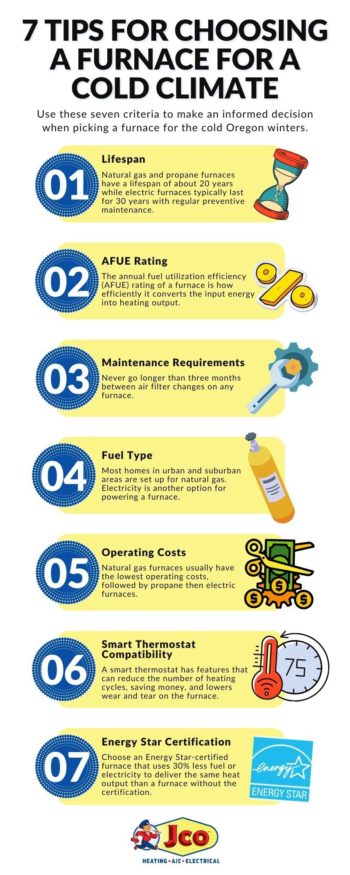Frigid winter air will soon arrive in Springfield, OR, so now is the time to shop for a replacement furnace. There are many makes and models of furnaces, and they all have different features and options. Use these seven criteria to make an informed decision when picking a furnace for the cold Oregon winters.
1. Lifespan
Buying a furnace is a big investment in your home. The installation process can also be somewhat disruptive, so you’ll want to make sure you get a furnace that will last for a long time. Natural gas and propane furnaces have a lifespan of about 20 years with proper maintenance. Electric furnaces typically last for 30 years with regular preventive maintenance.
2. AFUE Rating
The annual fuel utilization efficiency (AFUE) rating of a furnace is how efficiently it converts the input energy into heating output. The AFUE rating of gas furnaces ranges from 80% to 98.5%. This means that 80% to 98.5% of the fuel burned by the furnace becomes heat, and the remaining 1.5% to 20% of the fuel is wasted energy. Electric furnaces have a 100% AFUE rating. They convert all of their energy into heat output.
3. Maintenance Requirements
The combustion process can create a lot of soot, ash, grease, and grime. That’s because incomplete burning of the fuel allows particles to build up in the combustion chamber. This means that gas furnaces need more frequent cleaning and tune-ups. For long winters, you may need to have the furnace cleaned twice. Electric furnaces don’t burn anything, so there’s less buildup in the internal parts. They benefit from an annual preventive maintenance visit. Both types of furnaces require monthly air filter checks. If the filter is visibly dirty, replace it. Never go longer than three months between air filter changes on any furnace.
4. Fuel Type
In some areas, homes are not connected to a natural gas delivery system. You can still get a propane furnace, but you’ll have to arrange for regular delivery. Most homes in urban and suburban areas are set up for natural gas. Many other appliances also use natural gas, including ovens, clothes dryers, and water heaters. Implementing a natural gas furnace in a home that already has a natural gas connection will be a smooth process. Electricity is another option for powering a furnace. This type of furnace uses a set of resistance wires, much like a toaster or convection oven. The wires get hot, and the blower moves air across them. The air gets warm, then it enters the ducts and makes its way to your home’s living areas.
5. Operating Costs
Natural gas furnaces usually have the lowest operating costs, followed by propane then electric furnaces. However, these power sources’ prices are volatile, and they can change from season to season, year to year, and provider to provider. The operating costs will also vary by the furnace’s capacity and which energy-efficient features it has.
6. Smart Thermostat Compatibility
A smart thermostat has the potential to add a lot of convenience to your life. You can control your home’s temperature with an app on your phone. The smart thermostats have built-in software that automatically updates while connected to your Wi-Fi. These software updates include algorithms that allow your furnace to learn your schedule and optimize heating cycles. Smart thermostats also use geofencing and sensors to know when you’re home versus away. These features can reduce the number of heating cycles when you’re not home, saving money and lowers wear and tear on the furnace.
7. Energy Star Certification
If you want to lower your home’s carbon footprint and your heating costs, choose an Energy Star-certified furnace. They use 30% less fuel or electricity to deliver the same heat output than a furnace without the certification. There may be tax rebates and other incentives for installing an Energy Star-certified heating system in your home.
Jco Heating A/C Electrical is Springfield’s trusted provider of furnace replacement and installation services. We also offer heating and air conditioning maintenance and repair. Our ductless heating and cooling systems provide flexibility and comfort for home remodeling and new construction homes. If you’re a local business owner, you can turn to us for commercial heating and air conditioning services. To learn more about choosing a furnace for cold winters in Oregon, call us at Jco Heating A/C Electrical today.

 WE SERVICE ALL MAKES & MODELS
WE SERVICE ALL MAKES & MODELS